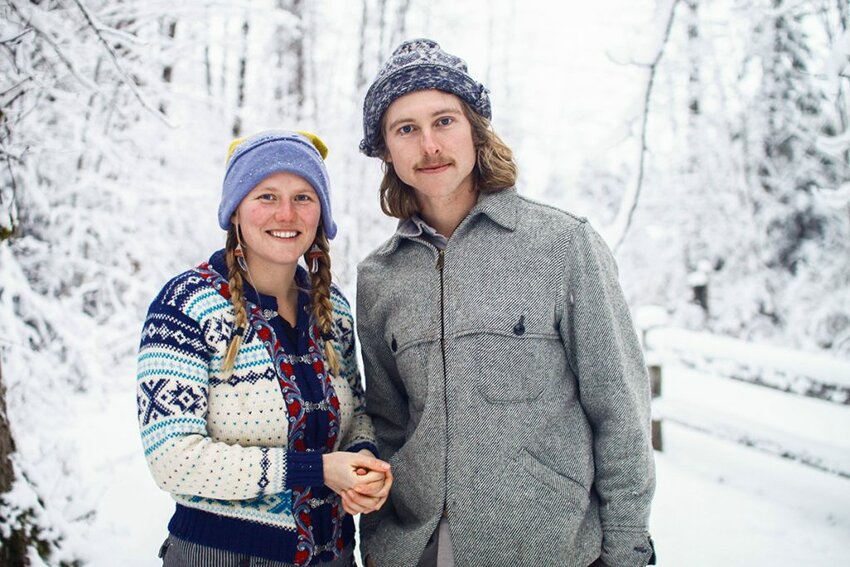 Zoe and Jordan of Twig Earthgoods at home in Glacier. Hannah Singleton photo.
Zoe and Jordan of Twig Earthgoods at home in Glacier. Hannah Singleton photo.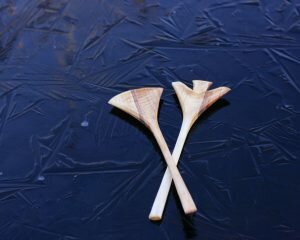
On a snowy weekday evening in a basement art studio in Glacier, Washington, Jordan Yates turned a bowl on a lathe while Zoe Petersen spun clay. I watched Zoe move slowly and intuitively, seeming to feel out the clay to reveal its inner shape. Rust-colored water dripped from her hands onto the wheel as she transformed the spinning clay into pristine shapes. Behind a makeshift curtain, Jordan’s hands braced a chisel as it sliced against wood, shaving off layers to reveal hidden grains and knots. Spirals of shavings flew like fireworks, ricocheting around the room, carpeting the floor. A hypnotic whooshing sound filled the room with each rotation of the bowl.
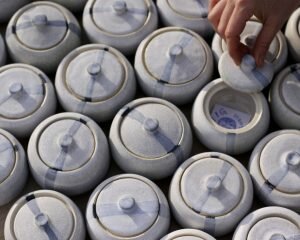
Ceramics and wood sat perched on shelves, a hodgepodge of raw materials and finished goods. On the desk in the center was an array of beautifully crafted mugs and spoons that the pair displays at the Bellingham Farmers Market.
Zoe and Jordan create and sell usable art together under the name Twig Earthgoods. Zoe makes ceramics, while Jordan primarily creates spoons. Together, they collaborate on pitchers, mugs and other ceramic items. Earlier that afternoon, they were greeted by familiar faces as we walked into the Wake ’N Bakery. We found an upstairs table where I watched them cradle their handmade mugs. One of the cups was a silvery tan color, with a pattern of lines around the top, and a wooden handle – an example of how the two artisans merge their art to create unique goods.
In their work, Jordan and Zoe aim to retain the elements of the hand. “We’re not competing with machines, we’re making handmade products. So, it’s nice to have those idiosyncrasies so that people can tell it is handmade,” Zoe explains. Their mission is to revive the lost art of handmade goods.
Zoe loves the idea of having a relationship with the maker of your belongings: “When you interact with the object, you’re almost holding their hand. Their hands are so much within the object.” In a world where people are so disconnected from their material possessions, Zoe and Jordan aim to familiarize this usually anonymous process.
Their process is as far from mass manufacturing as possible. When Jordan started his craft, he constructed spoons purely for functionality. Now, his process has evolved. “Every time I sit down to make a spoon, I can make a shape I’ve never made before. It feels very complex,” he said.
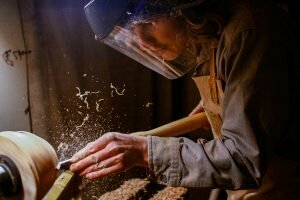
“And so much goes in to make it feel good,” Zoe explains. The shape, the angle of the handle – these are all elements that affect how a spoon feels when you use it.
Zoe and Jordan met in Bellingham about six years ago. After a year, they moved down to Taos, New Mexico, a town with a thriving arts scene where they launched into their work. Zoe started pottery while studying at Western Washington University, but refined her craft in New Mexico at a community studio. Surrounded by artists, she learned how to center the clay – one of the most fundamental aspects of the craft. And while Jordan had once used power tools, he learned the art of hand carving out of necessity while living off-grid.
After two years, they returned to Washington and moved to Glacier, a location that’s been pivotal for their work, as the North Cascades inspires their creations. Zoe replicates shapes and colors they encounter on outdoor explorations. Currently, snow and ice formations inspire design elements in her work. She’s making mugs resembling suncups: the honeycomb-like depressions that melt in the snow in the summer heat. Jordan’s connection to his landscape is physical; he uses fallen hardwood branches for his spoons. As he walks through the forest, he imagines the smell of the wood and pictures the colors and grains hiding under the bark. These experiences live in their finished products, embedded in each curve and detail.
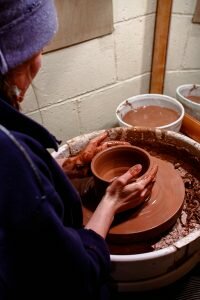
At the end of the day, we returned to the small camper up the road from their studio where Jordan and Zoe live. Here, handmade goods from friends and past teachers adorn their tiny kitchen. Jordan hands me a spoon with a design element. Facets, he tells me. These intentional knife marks form textured patterns in the wood. To me, they look like honeycombs. I’m reminded of the delicate web of lines that decorated the rim of some of Zoe’s mugs.
As they prepared for dinner, I reached into their collection of spoons. “It’s always interesting to see which one people will pick,” Zoe said. I grabbed one and turned it around in my fingers. It was beautiful, but not quite right. I exchanged it for another, running my fingers over the ridges and across the grain, holding the handle as I would when using it. Perfect. They served a dinner of lamb and roasted vegetables on handmade plates, using wooden spoons. These everyday tools were a collection of art made by people they held dear, and each contained a set of memories. As we settled in to eat, it was evident that Jordan and Zoe embodied the mission of their craft.
Twig Earthgoods can be found at the Bellingham Farmers Market, at Phoebe Bird on State Street in Bellingham, and on Instagram at twig_earthgoods.
Hannah Singleton was born and raised on the East Coast but moved out West after college and never looked back. She loves to share her enthusiasm for her local environment and public lands.